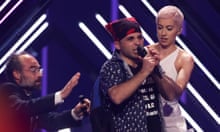The European Commission has fiercely criticised a decision by the Eurovision organisers to ban audience members from waving the EU flag at Saturday’s grand final in Sweden as “completely regrettable” and “mind-blowing”.
The European Broadcasting Union, which organises the annual song contest, blamed heightened geopolitical tensions for the ban, but indicated it was ready to think again next year. Footage shared on social media on Sunday showed the blue and gold-starred flag being waved at last year’s final, which was held in Liverpool.
The flag furore is the latest controversy to hit this year’s competition in Malmӧ, already overshadowed by a row over Israel’s inclusion and the disqualification of the Dutch entrant hours before the final.
Margaritis Schinas, a European Commission vice-president, told the Politico website that the ban was mind-blowing and said he would seek explanations and clarifications from the EBU, which unites 56 public broadcasters from across the continent, including EU democracies and autocratic states.
Eurovision “is first and foremost a celebration of European spirit, of our European diversity and talent”, Schinas wrote on X. “The EU flag is a symbol of this. Less than a month to the European elections, there should be no obstacles, big or small, to celebrating what unites all Europeans.”
A spokesperson for the European Commission president, Ursula von der Leyen, told reporters: “It is certainly completely regrettable that the flag of all the EU members taking part in the competition, as well as other states belonging to the Council of Europe, could not be shown.” There was “absolutely no reason” for the flag to be banned from the venue, they added.

The veteran Belgian MEP Guy Verhofstadt contrasted the ban with the protests in Georgia unfolding at the same time, when thousands took to the streets on Saturday night, some waving EU flags, to protest against a Russian-style “foreign agents” bill.
“As the EU flag is banned from Eurovision, people risk being beaten to demand a European path for Georgia,” Verhofstadt wrote on X. “Freedom, democracy can never be taken for granted!”
In a statement issued on Monday, the EBU said: “As in previous years such as 2023, [Swedish public broadcaster] SVT’s policy was to allow the flags of the participating countries and the rainbow flags. There has never been an express ban on the EU flag in the written policy.
“Due to heightened geopolitical tensions, the flag policy was more rigorously enforced by security at this year’s event. We will look again at the flag policy for 2025 in conjunction with our new host broadcaster.” The broadcaster next year will be Switzerland’s SRG SSR.
The EBU issued guidance in 2016 saying that the EU flag “will be tolerated” provided it was not used as “a tool to intentionally make a political statement during the show”.
The flag came into being in 1955 as the emblem of the Council of Europe, the pan-European human rights body separate to the EU, spanning Iceland to Azerbaijan. The European parliament adopted the flag in 1983 and it went into use at all EU institutions in 1986.









